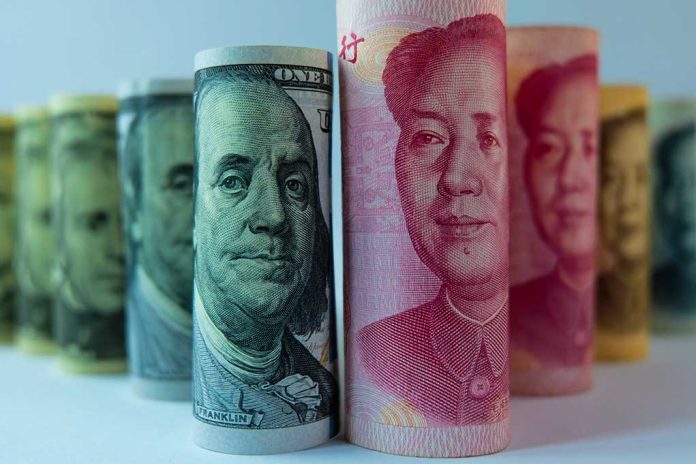
U.S. company Access Advance gives Chinese tech firms a 50% discount on crucial streaming patent licenses while forcing American businesses to pay full price, directly undermining President Trump’s efforts to combat unfair Chinese trade practices.
Key Takeaways
- Access Advance offers a 50% discount on video codec patent licensing fees to Chinese companies while charging full rates to U.S. firms
- Chinese companies facing U.S. sanctions, including DJI and Zhejiang Dahua, benefit from these discounted licensing fees
- The preferential pricing policy contradicts President Trump’s “America First” trade initiatives aimed at addressing China’s IP theft
- The discount is disguised by categorizing China as “Region 2,” excluding the U.S. and its allies from preferential rates
- This practice occurs while American tech companies face significant restrictions and bans in the Chinese market
America Last: How Access Advance Favors Chinese Tech
A disturbing pattern of preferential treatment for Chinese technology companies has emerged from Access Advance, a U.S.-based patent licensing firm. The company provides essential licenses for video codec technologies that power streaming platforms worldwide but applies a starkly different pricing structure depending on geography. While Chinese tech giants enjoy a 50% discount on these crucial licenses, American companies are forced to pay twice as much for the same technology, creating an uneven playing field that advantages foreign competitors over domestic businesses.
“It is accurate to say that Access Advance provides a 50 percent discount for sales in ‘Region 2 Countries.’ Those include many countries such as China, India, Vietnam, and Thailand,” said Peter Moller, the CEO of Access Advance.
The company’s pricing structure is particularly troubling given that Access Advance operates through patent pools, allowing companies to pay a single fee to use multiple patents. This system is designed to streamline licensing but has instead become a mechanism for providing preferential treatment to Chinese companies. The discount is cleverly disguised by categorizing China as part of “Region 2,” which specifically excludes the United States, United Kingdom, Europe, and other American allies from benefiting from reduced rates.
Undermining Trump’s Trade Policies
This preferential treatment directly contradicts President Trump’s ongoing efforts to address long-standing inequities in U.S.-China trade relations. The administration has consistently worked to combat China’s intellectual property theft, forced technology transfers, and unfair trade practices through targeted tariffs and policy initiatives. Access Advance’s discount policy effectively undermines these efforts by giving Chinese companies a competitive advantage in streaming technology at the expense of American businesses.
“I am very concerned about American companies giving preferential treatment to China,” said a trade official in the Trump administration.
What makes this situation particularly egregious is that even Chinese companies that have faced U.S. sanctions, like DJI and Zhejiang Dahua, are benefiting from these discounted licenses. Meanwhile, American tech firms continue to face significant barriers to entry in the Chinese market, with major platforms like Facebook, Twitter, and Google effectively banned in China. This one-sided arrangement creates a stark competitive disadvantage for U.S. companies both domestically and globally.
China’s Growing Influence in Patent Disputes
Access Advance’s preferential treatment for Chinese companies comes as China is rapidly expanding its influence in global patent disputes. The country is transitioning from being primarily a technology consumer to becoming a major patent holder, with companies like Huawei and ZTE building substantial Standard Essential Patent (SEP) portfolios. These patents are crucial for technologies like 5G, 6G, and autonomous vehicles, representing enormous economic value in the global market.
The situation is further complicated by China’s emerging role as a key jurisdiction for SEP disputes. The Chinese court system has begun challenging traditional patent regimes in the U.S., UK, and EU by asserting authority to set global licensing rates. This shift represents a strategic move by China to gain leverage in the international technology ecosystem, with potential implications for how intellectual property is valued and licensed worldwide.
The Path Forward
President Trump has been clear about his stance on China’s unfair trade practices, particularly regarding intellectual property. His administration has consistently worked to address these issues through targeted economic measures and policy initiatives. The preferential treatment offered by Access Advance directly contradicts these efforts and requires immediate attention from policymakers concerned with maintaining American technological competitiveness and protecting U.S. economic interests.
“China’s policies, practices, and actions about the forced transfers of American technology and the theft of American intellectual property,” said President Trump.
As China continues to expand its influence in the global patent landscape, the actions of companies like Access Advance take on greater significance. The practice of offering discounted rates to Chinese companies while charging American firms full price not only undermines U.S. competitiveness but also contradicts the principle of fair and reciprocal trade that has been central to President Trump’s economic policy. Without intervention, this pattern threatens to further disadvantage American technology companies in an increasingly competitive global marketplace.













